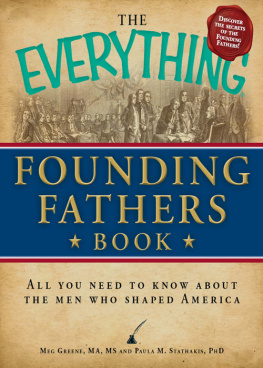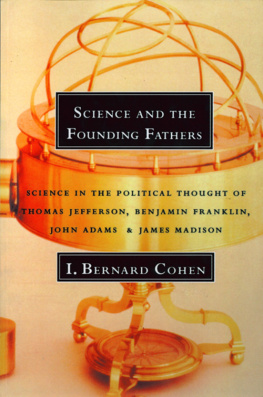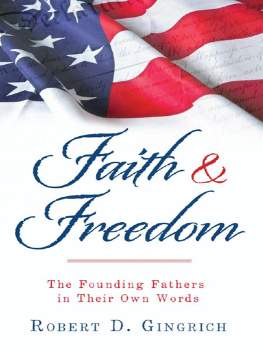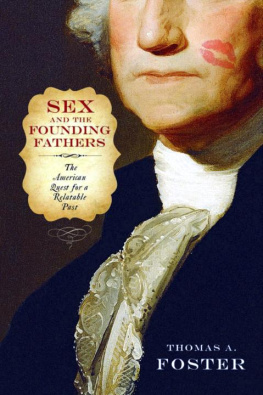

Copyright 2013 by Gordon Leidner
Cover and internal design 2013 by Sourcebooks, Inc.
Cover image Declaration of lndependence by John Trumbull, 1817, public domain
Sourcebooks and the colophon are registered trademarks of Sourcebooks, Inc.
All rights reserved. No part of this book may be reproduced in any form or by any electronic or mechanical means including information storage and retrieval systemsexcept in the case of brief quotations embodied in critical articles or reviewswithout permission in writing from its publisher, Sourcebooks, Inc.
All photos courtesy of the Library of Congress.
This publication is designed to provide accurate and authoritative information in regard to the subject matter covered. It is sold with the understanding that the publisher is not engaged in rendering legal, accounting, or other professional service. If legal advice or other expert assistance is required, the services of a competent professional person should be sought. From a Declaration of Principles Jointly Adopted by a Committee of the American Bar Association and a Committee of Publishers and Associations
Published by Cumberland House, an imprint of Sourcebooks, Inc.
P.O. Box 4410, Naperville, Illinois 60567-4410
(630) 961-3900
Fax: (630) 961-2168
www.sourcebooks.com
Library of Congress Cataloguing-in-Publication data is on file with the publisher.
Printed and bound in the United States of America.
BG 10 9 8 7 6 5 4 3 2 1
To our grandchildren
Contents
Preface
T HE F OUNDING F ATHERS of the United States of America led a revolution that was truly unique in world history. Prior to the establishment of the United States, the majority of the nations of the world had been ruled by monarchies or oligarchies. Democratic governments had been few, and virtually all of them had failed. The voices of the common people were rarely heard or heeded.
The Founding Fathers: Quotes, Quips, and Speeches narrates the Revolution story through the words of men who respected the abilities of the common people. The majority of the quotes are from men who are generally recognized as the primary Founding Fathers of the United States: George Washington, Thomas Jefferson, John Adams, Patrick Henry, James Madison, Alexander Hamilton, Benjamin Franklin, and Thomas Paine. There are also several quotes from other men who are frequently recognized as founders, such as Samuel Adams, John Jay, Gouverneur Morris, and George Mason.
Also included are a few quotes from American soldiers who, in risking their lives, made their invaluable contribution to the success of the Rebellion. To help explain the context of the Revolution, there are a handful of quotes from British generals and political leaders.
The Founders created three world-changing documents: the Declaration of Independence, the Constitution, and the Bill of Rights. Excerpts of the Declaration of Independence and the entire Bill of Rights are included, along with selected speeches, at the end of the book.
Each chapter begins with a short introduction to provide some background for the quotes that follow. To improve the quotes readability, minor changes were sometimes made to correct capitalization and punctuation errors, but spelling errors were usually left unchanged. The Internet offers many popular quotes attributed to the Founding Fathers that are, in fact, spurious. A sincere effort was made to make certain that erroneous quotes are not included, as evidenced by the endnotes in the back of the book.
I hope the reader derives as much pleasure in reading the original words of the Founders as I had in assembling them. You are invited to enter into the Spirit of 76 and hear the voices of people who changed the world.
Gordon Leidner

Background
T HE SEEDS OF the American Revolution began germinating in the early 1760s, after Britain defeated France in what is known in America as the French and Indian War. Under the pretext that the colonies should pay a larger proportion of the costs of their defense, Parliament sought to increase British authority by imposing a series of new laws, duties, and taxes. Beginning with the Stamp Act of 1765 and continuing with the Quartering Act, the Townsend Acts, and finally a series of laws that became known as the Intolerable Acts, the decade after the end of the French and Indian War became one of increasing animosity between Great Britain and her subjects in the American colonies.
Since America lacked official representation in the British Parliament, many colonists considered these laws to be an egregious violation of their rights as Englishmen. Colonists became increasingly hostile to the actions of British-appointed governors and judiciary, believing they were too willing to sacrifice justice on behalf of the King. The influence of the Church of England was also seen as unfair, and American Baptist, Congregationalist, and Presbyterian ministers became more outspoken in their criticism of government-sanctioned religion.
Impatient with Parliaments imposition of authority, American colonists elected the First Continental Congress in 1774 and appealed to King George III for his intervention. These appeals were ignored. Conflict broke out between American militia and British troops on April 19, 1775, in skirmishes at Lexington and Concord, Massachusetts. Two months later, the Continental Congress commissioned George Washington commander in chief of the Continental Army, and the Battle of Bunker Hill in Boston became the first major military engagement between British and American forces. Finally, in October 1775, George III declared the colonies in rebellion and the members of Congress traitors.
On July 4, 1776, the representatives from the thirteen colonies of the Second Continental Congress approved the Declaration of Independence, permanently severing ties with Great Britain and proclaiming the United States of America as a sovereign nation.
However, inherent weaknesses of the Continental Congress became obvious as the Revolutionary War progressed. The Congress had no authority to obtain revenue through taxes, regulate trade, or enforce treaties. These limitations resulted in a highly inflationary economy and an inability to pay the nations bills, including the wages for American soldiers.
The nascent American army, under the gifted leadership skills of George Washington, fought surprisingly well. In spite of being frequently outnumbered, poorly supplied, and up against one of the worlds strongest military powers, they successfully fought a war of attrition that lasted nearly eight years. Washingtons talents were challenged by the perpetual need for recruitment and supply of troops, the necessity of avoiding battles of annihilation by superior British armies, and the petty politics of Congress. Although suffering numerous military defeats, Washington, the armies under his command, and Americas French allies gained a number of strategic victories. These included the battles of Trenton and Princeton, New Jersey, in 1776; Saratoga, New York, in 1777; and Yorktown, Virginia, in 1781. The latter two battles resulted in the surrender of two entire British armies. After British General Cornwalliss surrender at Yorktown in October 1781, it became obvious to Britain that they could not defeat America militarily. Britain accepted the terms of the Treaty of Paris on September 3, 1783, officially ending the Revolutionary War and recognizing the United States as an independent nation.
Next page













